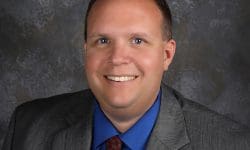How an Urban University Police Department Changed Its Culture
Congratulations to VCU Police Chief John Venuti, who is one of Campus Safety magazine’s Higher Ed Director of the Year award winners. He has transformed not only his department, but how his agency is perceived by the campus and surrounding community.

John Venuti is VCU's Police Department Chief of Police and Assistant Vice President of Public Safety.
Campus law enforcement departments have come under a lot of scrutiny lately, and nowhere is that more apparent than at urban institutions of higher education. Community-oriented policing can do much to address the security and community relations challenges often experienced by colleges, and John Venuti, who is Virginia Commonwealth University’s (VCU) police chief, has worked tirelessly to not only expand on this approach, but also adopt other processes that further enhance community partnerships.
RELATED: Spotlight on Director of the Year Finalist John Venuti
It is for this and many other reasons that Venuti was selected as one of Campus Safety magazine’s Director of the Year award winners.
Department Embraces Inclusivity
The first two things that Venuti points out when describing his institution are that it is urban and its community is diverse. As a result, an inclusive approach to law enforcement, security and relationships is embraced by him, his department and the university.
“We’re not the kind of campus where you can look at someone and say, ‘Oh, that’s a student, and that’s not a student,'” he says. “Being right smack in the middle of the city, we have an environment where everybody belongs.”
This understanding of his campus and the community where it is located drives many of Venuti’s efforts.
The Venuti File
- Name: John Venuti, Virginia Commonwealth University (VCU) Police Department Chief of Police and Assistant Vice President of Public Safety. He served as chairman of the Law Enforcement Subcommittee of the Governor’s Task Force on Sexual Assault, is president of the Virginia Public Safety Foundation and was formerly vice president of VACLEA. He is a graduate of Bluefield College and attended the FBI National Academy. Prior to his law enforcement career, he started with the CIA… the Culinary Institute of America.
- Campus: Virginia Commonwealth University is a major, urban public research university with national and international rankings in sponsored research. Located in downtown Richmond, VCU enrolls more than 31,000 students and employs 21,700 faculty and staff. The only academic medical center and Level I trauma center in the region, VCU Health is comprised of five health sciences schools, VCU Medical Center, Community Memorial Hospital, Children’s Hospital of Richmond at VCU, VCU Massey Cancer Center and Virginia Premier. There is also an academic campus in Doha, Qatar.
- Department: The VCU Police Department is comprised of 92 full-time sworn officers and more than 250 nonsworn security personnel. It is IACLEA-accredited and has an in-house training academy and an on-campus dispatch center. The department’s jurisdiction includes the core campus, hospital and additional territory in the city of Richmond where many students, faculty and staff members reside.
“He’s incredibly tuned into the mission of the university, but he’s also very tuned into the city and does very well with decision makers on all ends,” says VCU President Dr. Michael Rao.
He helped develop VCU’s Neighborhood Team, which is comprised of many different university offices, including the police department. The team works to solve the problems that often arise from student renters who live in the neighborhoods surrounding VCU. In fact, the chief created a special position in his agency where an officer’s sole purpose is to be the liaison with the neighborhood residents, fraternities and sororities so he can address issues as they arise.
In 2014, the liaison officer worked with dozens of landlords to rewrite lease agreements so that they now contain strict behavior clauses. Many even include VCU’s code of conduct. This effort educates both the renters and cosigners (parents) about the rules that students living off-campus must follow. As a result, more than 40 VCU students were evicted from their rental properties last year.
Although the goal of VCUPD is not to evict students, the department has recently implemented a process where students who continue to be disruptive can be held more accountable.
“They were evicted because they refused to cooperate and listen to the guidance we, the police department, were giving them,” says Venuti. “They were creating significant disruption in the neighborhoods they live in.
“We used to do what most police departments still do,” he adds. “You knock on the door, tell them to turn down the music, but what that protocol lacks is accountability. Now we come and show you the light, but we’re not going to continue. If you don’t want to take our advice and you’re continuing to create disruptions to the people who live in these neighborhoods, there’s got to be an accountability piece. We understand what college students do, and if you are a VCU student, you need to balance what you want to do with not creating that level of disruption.”
RELATED: Student Parties – How Virginia Commonwealth U. Manages Off-Campus Events
Additionally, a web-based service called PrtySmrt was launched that gives students the opportunity to register their off-campus events online. If the agency receives a noise complaint about a party, a text message is sent to the student organizers, letting them know that their event is too loud. If they don’t modify their conduct after the warning, then officers respond.
If you appreciated this article and want to receive more valuable industry content like this, click here to sign up for our FREE digital newsletters!
 Leading in Turbulent Times: Effective Campus Public Safety Leadership for the 21st Century
Leading in Turbulent Times: Effective Campus Public Safety Leadership for the 21st Century
This new webcast will discuss how campus public safety leaders can effectively incorporate Clery Act, Title IX, customer service, “helicopter” parents, emergency notification, town-gown relationships, brand management, Greek Life, student recruitment, faculty, and more into their roles and develop the necessary skills to successfully lead their departments. Register today to attend this free webcast!
















